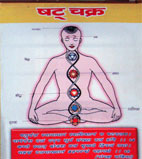

(Formerly Basic Principles)

FOCUS:
HIGHLIGHTS :
The
department has the following ongoing programs:
(a)
Teaching
of all fundamental principles of Ayurveda related subjects and
philosophical concepts described in Ayurveda at UG, PG & Doctorate
level.
(b)
Teaching
and research about the historical background of Ayurveda.
(c)
Conceptual
study of spiritual health & healing.
(d)
The
conceptual and clinical study on panchamahabhuta, tridosha, triguna, sara,
prakriti, bhutvidya (Para
Humanology).
(e)
Bhut-vidya
and Vyadhikshamatva Vigyan have been published first by this department to
extend the knowledge of Ayurveda in the field of divine therapy and
immunology in modern era.
(f)
Work
on Hindi commentary on Ayurveda Dipika, commentary on Charak Samhita
by Chakrapani Dutta, eleventh century is in progress.
(g)
Empirical
study of stress, anxiety, depression and alexithymia in modern life and
their clinical implications in the context of Ayurveda.
(h)
Role
of complementary medicine in health and helaing.





